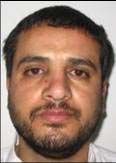

| Ali Musa Daqduq علي موسى دقدوق | |
|---|---|
 | |
| Born | 9 August 1969 to 5 March 1972 Beirut, Lebanon |
| Arrested | 20 March 2007 Basra, Iraq |
| Released | 16 November 2012 Iraq |
| Citizenship | Lebanese |
| Detained at | Guantanamo Bay camp |
| Other name(s) |
|
| Alleged to be a member of | Asa'ib Ahl al-Haq; Hezbollah |
| Charge(s) |
|
| Status | Two Iraqi courts found him not guilty and ordered his release. |
Ali Mussa Daqduq (Arabic: علي موسى دقدوق) is a senior Hezbollah leader and senior advisor to Asa'ib Ahl al-Haq leader Qais al-Khazali.[1] He was captured by US troops in Basra, Iraq on 20 March 2007 along with Qais al-Khazali and his brother Laith al-Khazali. He is alleged to have participated in the 20 January 2007 attack killing five US troops in Karbala. Later, in 2012, two Iraqi courts found him not guilty of masterminding the 2007 raid on an American military base and released him from prison.[2] US Intelligence has alleged that Daqduq's testimony during his internment is key evidence for collaboration between Iran and Hezbollah. He is alleged to have been a key facilitator of an IRGC-Quds Force sniper network in Iraq.[3]
On 2 July 2007, US forces identified that they had captured Daqduq.[4] They asserted he was a member of Hezbollah, and was operating with support from Iran. The 2 July press briefing published images of Daqduq's forged identity documents. Iranian officials denied that assertion on 4 July 2007.[5] Daqduq pretended to be deaf and mute when he was captured, and refused to speak for weeks.[6]
In November 2011 Reuters reported that the US was negotiating with the Iraqi government to hold Daqduq in US custody after the US pulls out of Iraq in December 2011.[6] An agreement could not be reached, and Daqduq was transferred to Iraqi custody on 18 December 2011.[7]
On 7 May 2012, Iraq dismissed terrorism and false documents charges against Daqduq. The case was automatically appealed, and he remained imprisoned until the appeal was heard in superior court. The United States believed that releasing him was a very bad idea, that the evidence was clear, and that he was likely to commit more acts of resistance against US occupation forces if released. Officials in the military commissions system in the United States began procedures to charge Daqduq with war crimes (specifically, that he killed or ordered killed four US soldiers captured during a raid); the future of this is unclear.[8]
On 16 November 2012, Daqduq was released from Iraqi custody as the Iraqi government determined that it no longer had a legal basis to hold him.[9] Following his release, the US added Daqduq to its list of Specially Designated Global Terrorists (SDGT) pursuant to Executive Order 13224.[10]
On 13 March 2019, Israel Defense Forces spokesperson Lt. Col. Jonathan Conricus accused Daqduq of having come back to Lebanon and then Syria, and founding a Hezbollah-operated network of "a few" Syrian operatives manning outposts in the Golan Heights border village of Hader, Syria and collecting intelligence against Israeli targets.[11] The accusation included video footage of men walking to and from the outposts.
Daqduq's son, Hassan Ali Daqduq, was killed in an Israeli airstrike in Syria's Quneitra governorate in December 2023.[12]
There have been earlier indications of Hezbollah involvement. Ali Mussa Daqduq, a senior Lebanese Hezbollah commander, was captured in Iraq in March 2007. At first he refused to talk, presumably to avoid giving away his Lebanese accent. As a consequence, he was initially dubbed Hamid the Mute by American officials.
{{cite news}}: CS1 maint: unfit URL (link)
– An Iranian official slammed what he called "ridiculous and false claims" from U.S. officials about the "arrest of a foreign citizen in Iraq and his relation with Iran."
With less than 60 days before the complete withdrawal of U.S. forces from Iraq, the United States is quietly seeking to keep custody of its highest profile detainee there, U.S. and Iraqi officials say.